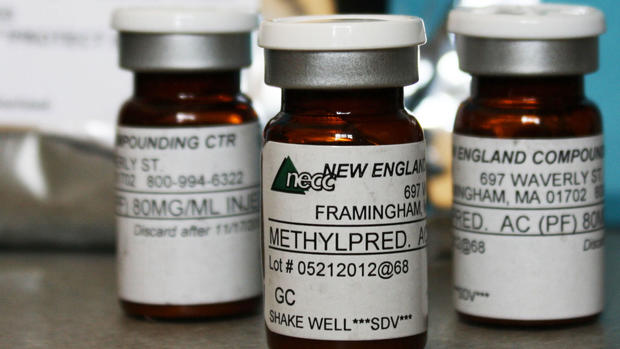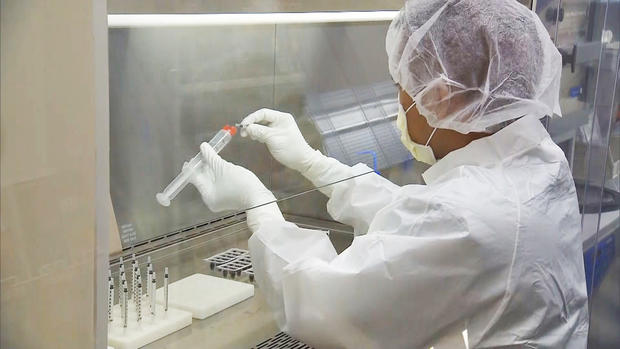Meningitis outbreak spreads to 15 states
The number of infections tied to a fungal meningitis outbreak has risen to 214 cases in 15 states, the Center for Disease Control and Prevention announced Monday.
The CDC says the number of deaths stands at 15. On Sunday, the agency had announced 205 infections in 14 states.
The latest state to report a meningitis infection is Pennsylvania. Fourteen other states are now reporting cases, including: Florida, Idaho, Illinois, Indiana, Maryland, Michigan, Minnesota, New Jersey, New Hampshire, North Carolina, Ohio, Tennessee, Texas and Virginia.
The outbreak has been linked to methylprednisolone acetate steroid shots used for back pain made by a specialty pharmacy in Framingham, Mass. called the New England Compounding Center. The medication has been recalled, but officials have said the injections shipped to 76 facilities in 23 states and may have been given to up to 14,000 patients.
States that received injections include: California, Connecticut, Florida, Georgia, Idaho, Illinois, Indiana, Maryland, Michigan, Minnesota, North Carolina, New Hampshire, New Jersey, Nevada, New York, Ohio, Pennsylvania, Rhode Island, South Carolina, Tennessee, Virginia, Texas and West Virginia. However, because the company is licensed in all 50 states, there is a possibility products were used elsewhere.
The Food and Drug Administration also announced Monday that a possible meningitis case under investigation may be caused by another type of pain injection made by the compounding center, so-called triamcinolone acetonide. The cases of meningitis identified to date however have only been associated with methylprednisolone acetate.
Tennessee is the worst-hit state in the current outbreak with 53 cases, followed by Michigan with 46 cases.
On Friday, health officials determined that a June shipment of epidural steroids was not part of a recalled batch that has been linked to the deadly fungal meningitis outbreak.
The CDC said on Friday that it became aware of the batch and officials were trying to determine whether it was part of the massive recall issued by the New England Compounding Center after the shots were linked to the outbreak.
At the CDC's main campus, officials say dozens of people are working day and night to bring a meningitis outbreak under control.
Dr. John Jernigan is a medical epidemiologist at the CDC, leading the clinical investigation team for the outbreak response. He says this infection, which is caused by a fungus, is very unusual.
Meningitis is typically caused by a virus or bacteria. The type of meningitis that has been found in the investigation is
caused by fungi Exserohilum and Aspergillus that are common in the
environment, but rarely cause meningitis.
The fungi are common in dirt and grasses, but are making people sick because they somehow got into steroid injections for people with back pain or pain in other joints, such as the ankles, knees or shoulders. The form of fungal meningitis involved in the current outbreak is not contagious.
People who received the steroid injections in question should look for symptoms such as headaches, back pain and nausea. Given the fungi involved, patients with confirmed cases should receive two strong antifungal drugs, but those recommendations may change. Even if a patient shows symptoms tied to the outbreak but tests negative for fungus, they should still be treated for fungal meningitis. Officials have said the earlier doctors intervene, the greater chances a patient survives.
Health officials also said last week they saw a case in one person who received an injection to their ankle and developed symptoms consistent with a fungal joint infection, such as pain, redness and swelling. There are now two reported cases of joint infections linked to the outbreak.

